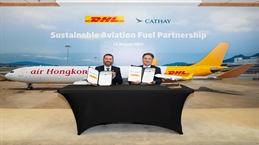
DHL Express and the Cathay Group have signed a new agreement to supply sustainable aviation fuel (SAF) for regional cargo flights, marking a significant step toward reducing carbon emissions in Asia’s air logistics sector.
Under the deal announced August 13, Cathay will provide DHL Express with 2,400 metric tons of SAF for use on flights operated by Air Hong Kong, a wholly owned subsidiary of Cathay.
The fuel will be used on routes departing from Seoul Incheon, Tokyo Narita and Singapore Changi airports.
“SAF is two to three times more expensive than aviation fuel,” Peter Bardens, senior vice president for network operations and aviation for DHL Express in the Asia Pacific, said. He emphasized the company’s aggressive target of 30% SAF supply by 2030, sending a strong message to the industry, manufacturers, and governments about the importance of sustainability.
“For DHL Express, it doesn’t just stop with sustainable aviation fuel,” he added, noting that the company examines every opportunity to reduce greenhouse gas emissions.
Bardens said that DHL is also focused on carbon-neutral buildings and will invest in that space when viable options become available.
Cathay aims to have 10% of its total fuel consumption come from SAF by 2030, and has pledged to use SAF to offset 10% of carbon emissions from employee duty travel starting in 2024.
The partnership is expected to cut lifecycle greenhouse gas emissions by approximately 7,190 metric tons through 2025, roughly equivalent to the emissions from more than 100 Airbus A330 freighter flights between Hong Kong and Singapore.
“Sustainable aviation fuel currently accounts for less than 1% of global jet fuel consumption, yet air transport is one of our biggest sources of greenhouse gas emissions,” Bardens said.
“Our decision to expand SAF usage in Asia with Cathay is another important step to drive momentum in SAF production and demand.”
The agreement marks the first time SAF will be used on Air Hong Kong flights and adds DHL Express to Cathay’s Corporate SAF Program, which launched in 2022 to help corporate partners reduce emissions from business travel and airfreight.
In 2024, the program enabled the use of more than 6,000 metric tons of SAF, with 16 partners including HSBC, AIA and Standard Chartered.
Cathay has been expanding its SAF initiatives across the region. Earlier this year, the group partnered with Sinopec to supply SAF produced in mainland China to Hong Kong International Airport — the first such export by Sinopec. Cathay also signed a deal with SK Energy to secure SAF supply in South Korea through 2027.
“SAF remains a core pillar of our strategy to address carbon emissions, and collaboration is essential to scaling its use,” Tom Owen, director of cargo for the Cathay Group, said. “We are excited to be working with like-minded partners like DHL Express to make SAF more accessible and scalable, particularly in Asia.”
DHL Express has also secured long-term SAF agreements with global producers including Neste, bp and World Energy. Earlier this year, the company partnered with Cosmo Oil Marketing to use SAF produced in Japan for outbound flights. Most recently, DHL signed a deal with Neste for 7,400 metric tons of SAF for flights departing Singapore.
Both companies say the collaboration supports broader sustainability goals. DHL Group aims to achieve net-zero emissions logistics by 2050 as part of its Strategy 2030, which identifies “green logistics of choice” as a key priority.
Air Hong Kong operates an all-Airbus A330 freighter fleet and serves 17 destinations across Asia, the Middle East, Europe and Australia.



